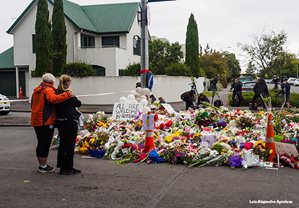The problem with writing about tragedy is that it seems to happen so often and so fast. I wakened on Friday morning to hear the news from New Zealand that truly shocked me.
The news came, not from the BBC or Sky but from our family WhatsApp group. With family members spread across the globe, including USA, Canada and New Zealand, it has become the best way to communicate though the different time zones mean that messages can arrive at all hours of the night or day.
Sadly, we have almost become accustomed to hearing news of mass shootings most often from the US. For me the news was doubly shocking – my son is an A&E doctor in Wellington and as I started to write this, the hospital was preparing to receive some of the casualties from Christchurch. Also, my wife Sandra and I had visited the city just last month and it and we both agreed that it was a great city with an air of positivity and sense of recovery after the tragedy of the earthquake in February 2011 which killed 185 people.
 I decided to mull this piece over during the weekend and refine it a little, but the events of the weekend caused me to rethink it.
I decided to mull this piece over during the weekend and refine it a little, but the events of the weekend caused me to rethink it.
First, I was reminded by a friend about the tragedy in the Philippines in January when two bombs in a Roman Catholic cathedral killed 20 people and injured dozens more. Like many, I seem to have missed the news coverage of that at the time.
Then there was news about the shooting in Utrecht. Then news came in about tragedies of a more local nature – a mother of three children found drowned in Carlingford Lough, two young men killed in a car crash in the same town, another fatal collision in Toome and then the young people crushed to death in Cookstown.
Originally I was going to attempt to consider why God allows tragedies to happen or perhaps attempt to answer the question – “why do bad things happen to good people?” Sadly I feel that answering these questions is probably beyond my theological ability – other than to recognise that God’s Great Plan is beyond our ability to understand. I am reassured that despite everything, God’s love for us is steadfast and unconditional.
Romans 8: 38-39 reads, “Nothing can ever separate us from God’s love. Neither death nor life, neither angels nor demons, neither our fears for today nor our worries about tomorrow – not even the powers of hell can separate us from God’s love.”
So then my thoughts turned in a different direction. Rather than trying to understand the unfathomable should we not try to do something practical that might be of benefit to someone affected by a tragedy?
Here are a few suggestions – some based on my personal experience and some not –
- As Christians our first response should be to pray for those directly affected by these tragedies and to pray for those working with the survivors in hospitals and for those first responders who will carry memories of what they saw for the rest of their lives.
Pray that the wounded will be healed and make a full recovery. That the doctors and nurses and paramedics and all working with the survivors will have the health and strength and ability to deal with all the situations they face.
Pray for the relatives and the friends of those who have died that they will be comforted in their grief.
Pray for the organisations supporting the bereaved and injured that they would receive the support – both financial and emotional – that they need.
- Often there are gatherings where people can show support and solidarity with the injured and bereaved. Attend if possible. Distance might prevent this but a kind thought in a card is often welcome. I certainly found that to be the case during bereavements. There might be an opportunity to sign a book of condolence.
- You might feel that, when the time is right, a visit to a family or to a group might be appropriate either to offer assistance or support. Don’t feel that it is ever too late to do this as grief endures for a long time. Locally we have a long tradition of helping by preparing food and this is always welcome though there are many ways of offering practical support – transport to a hospital, baby-sitting, advice about procedures or form-filling for example.
- Perhaps there is a need to provide sustainable support for a group or for individuals. This could be done through your local church by way of a fund-raiser either a simple, collection or an event where people have the opportunity to show support and make a donation. Often there will be a well-publicised appeal fund or a charity to which contributions can be made but you may have to search out details of groups that already exist that need financial help.
Some suggestions:-
EMBRACE – a local charity working to support refugees arriving in Northern Ireland.
NICRAS – a local refugee-led charity representing the interests of refugees.
Bryson House – a local charity who is working to provide support.
These organisations can advise on practical ways to support refugees whether by direct financial assistance or offer of accommodation or clothing or perhaps you might have time to help as a volunteer.
- Finally, you might want to think in the longer-term. Perhaps there is an opportunity to work with young people in your church or area where the benefit of your life experience may be transferrable to an individual or group to better prepare for life ahead. You could volunteer at your local Youth Club or perhaps offer yourself as a mentor to a young person who could be guided through a few of life’s problems. Maybe your church could consider setting up a mentoring scheme which could allow this to happen. Talk to your minister today!
 Richard Russell is PCI's Programme Development Officer in the Council for Congregational Life and Witness.
Richard Russell is PCI's Programme Development Officer in the Council for Congregational Life and Witness.